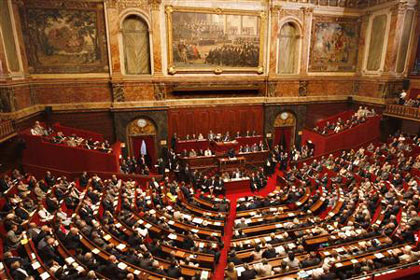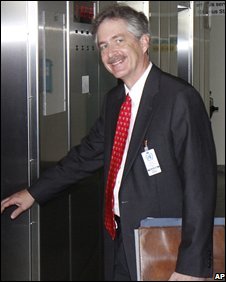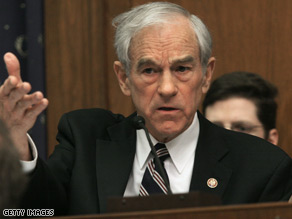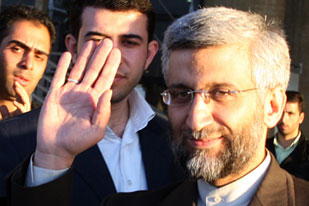You are hereArchive - Jul 2008
Archive - Jul 2008
Ten years after it was introduced, France bids au revoir to the compulsory 35-hour work week as part of economic reforms

(quote)
PARIS: Ten years after it was introduced, France has ended the compulsory 35 hour work week. Legislators in France have voted to allow companies to sidestep the 35-hour workweek by negotiating individual overtime agreements with their employees. The new legislation, which was passed by Parliament late Wednesday night and which will take effect in September, is the boldest step yet in stripping what many view as an emblematic labor law, without quite getting rid of it. While the workweek limit is as good as buried, every hour beyond 35 that is worked will be considered overtime and will therefore be more expensive.
Labour Minister Xavier Bertrand denied that people would have more working hours imposing on them and said now "everything will be negotiated company by company." Under the new legislation no one in France can work more than 48 hours in a given week, including overtime. Right now, despite the current law, many French employees work longer than 35 hours a week but accumulate time off or overtime. They actually average 41 hours, compared with 41.7 in Germany, 43.1 in Britain, 41.3 in Italy and the EU average is 41.9. In terms of paid annual leave, the French are in the mid-range in Europe with 25 days holiday as guaranteed non-working days.

The new legislation opens the way for company-specific negotiated agreements between employers and labor unions about the number of hours a week and days a year an employee works. The new limits are more generous than before: For manual workers who are paid by the hour, the weekly maximum limit rises to 48 hours, in line with European Union legislation. For white-collar staff members, paid by the day, the annual maximum of days they can be asked to work will rise to 235 days from 218. Also up for negotiation is the amount of time an employee gets in compensation for the extra hours worked, as opposed to being paid for the overtime.
The new changes are likely to affect small and medium-sized businesses most. Many large companies benefited from the additional flexibility that the 35-hour week provided by allowing them to annualize work time, making staff members work more in high season and less in low season without having to pay costly overtime. Blue-collar workers have periodically complained that this practice ended up reducing their income.

But most employees, and particularly those with comfortable incomes and a preference for additional time off, have grown attached to the shorter workweek. Professionals, whose salaries are calculated on a daily basis rather than hourly, fear that they will lose a dozen extra holidays a year that they had enjoyed in compensation for working more than the legal 35 hours a week. Their dismay at the changes was on display Wednesday afternoon when hundreds protested outside the Senate building, sporting banners with slogans like "There is life after work." And the union that represents white-collar employees and management staff, CFE-CGC, published an open letter in French newspapers complaining about the changes.
The new legislation also includes rules to make labor unions more representative. Any union participating in negotiations on work time needs to have obtained at least 10 percent of the vote in company elections. But any union representing 30 percent or more of the internal vote is allowed to sign a binding agreement with management.
(unquote)
Photos courtesy of The Economist, Reuters/Charles Platiau, and AFP
Original Source: euronews and International Herald Tribune
Supplies up, demand declines, oil trades near 7-week low - drops below $125 for first time in over 6 weeks

(quote)
July 24 (Bloomberg) -- Crude oil traded near a seven-week low after reports showed demand in the U.S. and Japan, two of the three largest oil consuming countries, fell as high prices crimp fuel consumption. U.S. fuel demand averaged 19.9 million barrels a day last week, the lowest since January 2007, the Energy Department said yesterday. Japan imported 0.7 percent less oil in June than a year ago, the first decline in nine months, the Ministry of Finance said today.
"Our overall view is that oil prices are at a point that will bring about demand-side adjustments that will ultimately cause prices to be at a lower level," said David Moore, a commodity strategist with Commonwealth Bank of Australia Ltd. in Sydney. "There seems to be an intangible factor here where sentiment has swung quite sharply in the past couple weeks."

Crude oil for September delivery was at $124.23 a barrel, down 21 cents, at 11:36 a.m. Singapore time on the New York Mercantile Exchange. Yesterday, oil dropped $3.98, or 3.1 percent, to settle at $124.44 a barrel, the lowest close since June 4. Futures have lost 5 percent this week. Oil prices also fell as the Energy Department report showed that gasoline supplies rose 2.85 million barrels last week. Stockpiles of distillate fuel, a category that includes heating oil and diesel, climbed 2.42 million barrels. Brent crude oil for September settlement was at $125.10 a barrel, down 19 cents, on London's ICE Futures Europe exchange at 11:34 a.m. Singapore time. It dropped $4.26, or 3.3 percent, to close at $125.29 a barrel yesterday, the lowest settlement since June 4.
Demand has declined for three straight weeks, the Energy Department report showed. U.S. fuel consumption averaged 20.3 million barrels a day in the past four weeks, down 2.1 percent from a year earlier, the department said. Refineries operated at 87.1 percent of capacity last week, down 2.4 percentage points from the week before, according to the department. It was the lowest utilization rate since the week ended May 9. Refineries were forecast to operate at 89.5 percent of capacity last week, unchanged from the week before, according to the median of analyst estimates in the Bloomberg survey. Crude-oil inventories dropped 1.56 million barrels to 295.3 million. Stockpiles were forecast to decline 675,000 barrels, according to the survey results.

Oil has tumbled 16 percent from a record $147.27 a barrel on July 11, as a stronger U.S. dollar limited the appeal of commodities as a hedge against inflation and high prices cut fuel consumption. Prices also fell the past two days as Hurricane Dolly moved away from oil platforms in the Gulf of Mexico.
Energy companies evacuated some oil rigs as a precaution. That cut production in the Gulf by 4.7 percent, the U.S. Interior Department said yesterday. Companies that carried out evacuations include BP Plc, Noble Corp., Chevron Corp., Devon Energy Corp., Citgo Petroleum Corp. and Royal Dutch Shell Plc.
Oil and other commodities may drop further and the dollar increase if the Federal Reserve boosts interest rates to curb inflation. Philadelphia Fed President Charles Plosser yesterday said higher mortgage costs and continued declines in house prices pose no bar to raising interest rates. Policy makers must increase borrowing costs before inflation expectations become "unhinged," Plosser said in an interview with Bloomberg Television yesterday.
The dollar traded at 107.74 yen at 11:11 a.m. in Singapore, after rising 0.5 percent yesterday, when it reached 107.97, the highest since June 26. The U.S. currency was at $1.5684 per euro, after rising 0.5 percent yesterday and touching $1.5670, the strongest since July 9.
(unquote)
Photos courtesy of AP/Energy Department, Bloomberg News and LA Times
Original Source: Bloomberg
Google launches Wikipedia challenger Knol after 7-month test - a wiki with bylines and moderation

(quote)
SAN FRANCISCO (Reuters) - Google Inc. opened its website Knol to the public on Wednesday, allowing people to write about their areas of expertise under their bylines in a twist on encyclopedia Wikipedia, which allows anonymity. "We are deeply convinced that authorship -- knowing who wrote what -- helps readers trust the content," said Cedric DuPont, product manager for Knol. The name of the service is a play on an individual unit of knowledge, DuPont said, and entries on the public website, knol.google.com, are called "knols." Google conducted a limited test of the site beginning in December.
Knol has publishing tools similar to single blog pages. But unlike blogs, Knol encourages writers to reduce what they know about a topic to a single page that is not chronologically updated. "What we want to get away from is 'this last voice wins' model which is very difficult if you are a busy professional," DuPont said.

Google wants to rank entries by popularity to encourage competition. For example, the first knol on "Type 1 Diabetes" is by Anne Peters, director of the University of Southern California's Clinical Diabetes Programs. As other writers publish on diabetes, Google plans to rank related pages according to user ratings, reviews and how often people refer to specific pages, DuPont said. Knol focuses on individual authors or groups of authors in contrast to Wikipedia's subject entries, which are updated by users and edited behind the scenes. read more »
Planned Ron Paul rally blossoms into 3-day mini-convention due to unprecedented response, moves to larger venue at Target Center

(quote)
*Update*: Who is Dr. Ron Paul? Ron Paul was born and raised in Pittsburgh, Pennsylvania. He graduated from Gettysburg College and the Duke University School of Medicine, before proudly serving as a flight surgeon in the U.S. Air Force during the 1960s. He and his wife Carol moved to Texas in 1968, where he began his medical practice in Brazoria County. As a specialist in obstetrics/gynecology, Dr. Paul has delivered more than 4,000 babies. He and Carol, who reside in Lake Jackson, Texas, are the proud parents of five children and have 17 grandchildren.
(CNN)— Former Republican presidential candidate Ron Paul is moving forward with plans for his own rally during the Republican National Convention —and is moving his location to a larger arena to accommodate the unprecedented response.
The three day event called ‘Rally for the Republic’ will officially launch Paul’s new political action group: the ‘Campaign for Liberty.’ When planning for the event began earlier this year, it was originally scheduled to take place at the University of Minnesota, but due to a “strong initial response,” it was moved to The Target in Minneapolis, which can house up to 18,000 people. The GOP holds its convention across the river in St. Paul.
20July1969. Armstrong steps off the lunar landing module Eagle, 1st human to walk on the moon, 240,000 miles from Earth

(quote)
Neil Armstrong walks on moon
At 9:32 a.m. on July 16 1969, with the world watching, Apollo 11 took off from Kennedy Space Center with astronauts Neil Armstrong, Edwin Aldrin Jr., and Michael Collins aboard. Armstrong, a 38-year-old civilian research pilot, was the commander of the mission. After traveling 240,000 miles in 76 hours, Apollo 11 entered into a lunar orbit on July 19. The next day, at 1:46 p.m., the lunar module Eagle, manned by Armstrong and Aldrin, separated from the command module, where Collins remained. Two hours later, the Eagle began its descent to the lunar surface, and at 4:18 p.m. the craft touched down on the southwestern edge of the Sea of Tranquility. Armstrong immediately radioed to Mission Control in Houston, Texas, a famous message: "The Eagle has landed."
At 10:56 p.m. EDT, American astronaut Neil Armstrong, 240,000 miles from Earth, speaks these words to more than a billion people listening at home: "That’s one small step for man, one giant leap for mankind." Stepping off the lunar landing module Eagle, Armstrong became the first human to walk on the surface of the moon.
(unquote)
Photo courtesy NASA / Andrew Chaikin
EU, US and Iran to hold historical nuclear talks in Geneva; Iran open to US diplomatic talks

(quote)
GENEVA (Reuters) - Major world powers will sound out Iran's readiness to negotiate an end to the long dispute over its nuclear program on Saturday. The unprecedented participation of a senior U.S. official in the one-day meeting in Geneva, together with Iranian comments playing down the likelihood of an attack by the United States and Israel, have raised hopes of progress.
Arriving for talks with officials from the United States, Russia, China, France, Britain and Germany -- the so-called sextet -- chief Iranian nuclear negotiator Saeed Jalili said he had "positive intentions". Jalili has a mandate from Iran's Supreme Leader Ayatollah Ali Khamenei and President Mahmoud Ahmadinejad to take any decision needed, a senior Iranian official told Reuters, adding that the meeting "will clarify the fate of the negotiations".




















